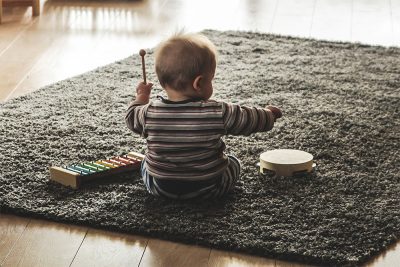 The age-old question of when to start music lessons is a good one!
The age-old question of when to start music lessons is a good one!
History is full of child prodigies in the world of music, from Beethoven to Stevie Wonder. Whether in school or church, almost everyone knows of someone in their own family, or another, that has a tremendous gift for a musical instrument. This often allows parents to feel pressured to enroll their child into music lessons at a young age. Could this young exposure to music be one of the secrets to success? There are studies that have shown this to definitely be a helping factor!
On the other hand, we’ve all heard from someone that says they were “forced” into taking music lessons at a young age, which brought them to a point of disliking not only the lessons, but the instrument itself. Parents that have had this sort of upbringing tend to lean towards waiting for their kids to show an interest in music; for their child to become a bit older before making a decision whether or not they even want to play a musical instrument. There is nothing wrong with this approach either.
Since each child is different, both of these approaches can be the right way to do it.
One thing is for certain, and that is when a child is young, and their mental abilities are still in the prime stages of development, they are in the perfect place to be exposed to music.
The question that should be asked is not so much at what age to start music lessons, but what is the goal of the music lessons? A very young child isn’t exposed to an instrument to master it, but instead to gain experience and develop a positive relationship with music. If this is your goal, then “lessons” could start any time after birth. These lessons wouldn’t necessarily be what most would consider formal lessons. They would focus on immersing the child in a musical environment, through simple activities like musical games, or swaying and dancing while singing or playing a musical instrument for the child.
Around the age of 3, the child could be ready for an introduction to more formal lessons. At this age, the goal would still have a focus on things like finding the beat within a piece of music, or identifying an instrument or melody.
At age 5, a lot of kids have developed enough of a musical foundation that has prepared them for formal music lessons. At this age, the goal of the lesson should still be to further their understanding of music. Piano and violin are two of the most popular instruments to start learning at this young age, but other good possibilities include the guitar, ukulele and recorder.
By the age of 10, children will not only have a number of skills connected with their instrument of choice, but also possess the physical strength to try other, larger instruments. Some of these could include a brass or larger stringed instrument that would require more strength and stamina. At this time in their musical upbringing, the goal of the music lessons starts to transition from building experience with music, to improving on their performance ability.
Please keep in mind that all children are different, and these are only guidelines. The important thing to remember is that exposing a child to music at a young age has a lot of benefits in their development, and can open the door to a life full of amazing experiences and opportunities.

